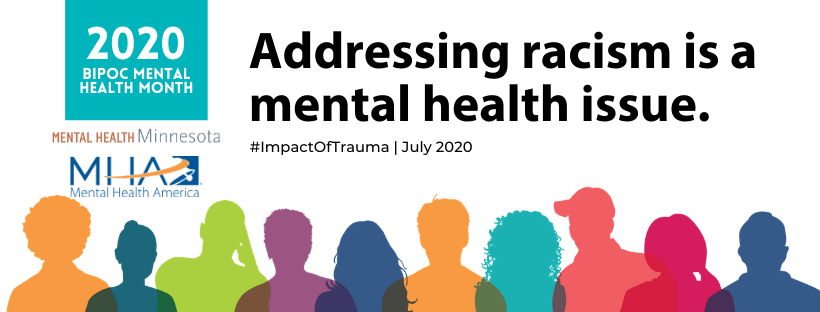We are honored to celebrate the first-ever BIPOC Mental Health Month in July! This month was previously known as Minority Mental Health Month. Why the change?
Our affiliate, Mental Health America (MHA), named July Minority Mental Health Month in posthumous honor of Bebe Moore Campbell, a best-selling author, journalist and mental health advocate in 2008. MHA honored Campbell each year following this date by creating a toolkit to address the mental health needs of underserved and underrepresented populations in an effort to elevate voices and improve understanding of the challenges these individuals face.
Yet in the weeks following George Floyd’s death, it’s evident that our country is still experiencing the longstanding effects of racism and bigotry, which often went unchecked and unmentioned in systems of care and other services. Systemic racism and bigotry inflict significant, long-term trauma on individuals, which can have terrible mental health consequences. Therefore, it was a time to re-examine the messaging of this Minority Mental Health month, ensuring it aligned with the experiences underrepresented communities are facing daily.
In the mental health field, we use “person-first” language to help individuals identify as human beings first, versus being identified for their mental health status. BIPOC (Black, Indigenous, and People of Color) emerged as a person-first acronym that emphasizes the individual, versus “minority, which removes personhood by talking about quantity versus quality. The word “minority” also represents a difference in power between “majority” and “minority” groups, insinuating inferiority.
It became clear that the word “minority” no longer represented the message of the mental health community and instead perpetuated negative images and stereotypes. The term BIPOC, we feel, more fairly honors the unique experiences and existence of “BI” Black and Indigenous individuals and “POC” people of color. Thus, moving forwarding MHA and its affiliates will no longer use the word “minority” in our materials.
MHA developed information and resources specifically for Black, Indigenous People of Color BIPOC) and LGBTQ+ communities. We’ve included some of these resources as downloads on this page. They include handouts on racism and mental health and racial trauma; an infographic built from MHA screening data on BIPOC and LGBTQ+ mental health.
We also ask people to share how discrimination and/or racism have affected their mental health, using the hashtag #ImpactofTrauma.
